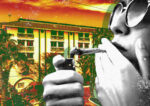Perhaps we know what warehouse owner David Chi-Yu Lai, accused of allegedly allowing tenants in San Francisco to grow 6,000 marijuana plants without a license, was smoking.
The city sued the owner and property manager of two Bayview warehouses for allegedly allowing tenants to illegally operate the cannabis grows at 1355 Fitzgerald Avenue and 1510 Wallace Avenue, in Bayview, the San Francisco Standard reported.
The two warehouses were leased by Lai’s company P.A.A. Property, based in South San Francisco, to two separate tenants, both of whom used the buildings to grow pot, according to the lawsuit.
City Attorney David Chiu alleges that Lai was aware of the operations and profited from leasing the warehouses for the illegal cannabis venture.
He said growing marijuana illegally directly impacts legal growers and amounts to unfair business practices by flooding the marijuana market with cheaper pot because not paying taxes or regulatory fees lowers costs.
“That’s why it’s so important,” Chiu told the Standard. “We have many lawful operators and small businesses that have invested their life savings in playing by the rules and this undermines their industry.”
Chiu’s lawsuit is not a criminal complaint, according to SFist. The city demands Lai and other unidentified defendants cease these activities and pay penalties totaling $167,500.
Lai did not respond to requests for comment from the newspaper. According to the city, he admitted to knowing about his tenants’ illegal activity after surveillance images showed him entering one of the grow facilities.
California legalized recreational cannabis in 2016. To grow it, operators in San Francisco must have a license from the state Department of Cannabis Control.
While investigating the two P.A.A. properties last year, the state “seized 4,485 mature cannabis plants, 1,332 immature cannabis plants, and nearly 300 pounds of cannabis shake,” or finer consistency buds, according to the department.
The grow houses posed major safety risks to the residential Bayview community, Chiu said.
Court documents detail code violations that included exposed wires, loose CO2 tanks, missing sensors and warning systems that could have resulted in an explosion or fire.
— Dana Bartholomew
Read more



